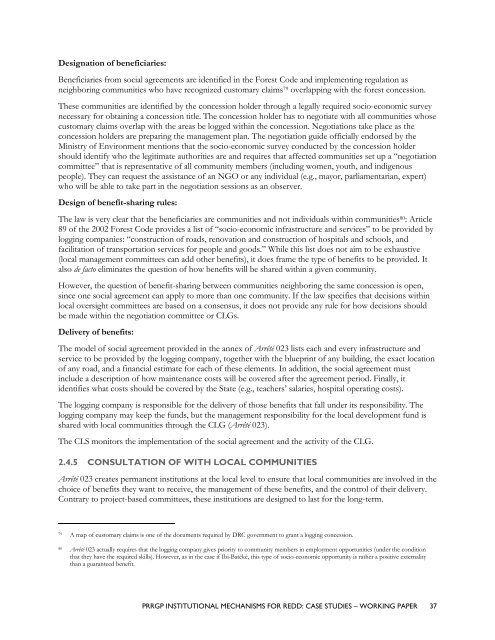Institutional Mechanisms for REDD+ - Case Studies Working Paper
Institutional Mechanisms for REDD+ - Case Studies Working Paper
Institutional Mechanisms for REDD+ - Case Studies Working Paper
You also want an ePaper? Increase the reach of your titles
YUMPU automatically turns print PDFs into web optimized ePapers that Google loves.
Designation of beneficiaries:<br />
Beneficiaries from social agreements are identified in the Forest Code and implementing regulation as<br />
neighboring communities who have recognized customary claims 79 overlapping with the <strong>for</strong>est concession.<br />
These communities are identified by the concession holder through a legally required socio-economic survey<br />
necessary <strong>for</strong> obtaining a concession title. The concession holder has to negotiate with all communities whose<br />
customary claims overlap with the areas be logged within the concession. Negotiations take place as the<br />
concession holders are preparing the management plan. The negotiation guide officially endorsed by the<br />
Ministry of Environment mentions that the socio-economic survey conducted by the concession holder<br />
should identify who the legitimate authorities are and requires that affected communities set up a ―negotiation<br />
committee‖ that is representative of all community members (including women, youth, and indigenous<br />
people). They can request the assistance of an NGO or any individual (e.g., mayor, parliamentarian, expert)<br />
who will be able to take part in the negotiation sessions as an observer.<br />
Design of benefit-sharing rules:<br />
The law is very clear that the beneficiaries are communities and not individuals within communities 80: Article<br />
89 of the 2002 Forest Code provides a list of ―socio-economic infrastructure and services‖ to be provided by<br />
logging companies: ―construction of roads, renovation and construction of hospitals and schools, and<br />
facilitation of transportation services <strong>for</strong> people and goods.‖ While this list does not aim to be exhaustive<br />
(local management committees can add other benefits), it does frame the type of benefits to be provided. It<br />
also de facto eliminates the question of how benefits will be shared within a given community.<br />
However, the question of benefit-sharing between communities neighboring the same concession is open,<br />
since one social agreement can apply to more than one community. If the law specifies that decisions within<br />
local oversight committees are based on a consensus, it does not provide any rule <strong>for</strong> how decisions should<br />
be made within the negotiation committee or CLGs.<br />
Delivery of benefits:<br />
The model of social agreement provided in the annex of Arrêté 023 lists each and every infrastructure and<br />
service to be provided by the logging company, together with the blueprint of any building, the exact location<br />
of any road, and a financial estimate <strong>for</strong> each of these elements. In addition, the social agreement must<br />
include a description of how maintenance costs will be covered after the agreement period. Finally, it<br />
identifies what costs should be covered by the State (e.g., teachers‘ salaries, hospital operating costs).<br />
The logging company is responsible <strong>for</strong> the delivery of those benefits that fall under its responsibility. The<br />
logging company may keep the funds, but the management responsibility <strong>for</strong> the local development fund is<br />
shared with local communities through the CLG (Arrêté 023).<br />
The CLS monitors the implementation of the social agreement and the activity of the CLG.<br />
2.4.5 CONSULTATION OF WITH LOCAL COMMUNITIES<br />
Arrêté 023 creates permanent institutions at the local level to ensure that local communities are involved in the<br />
choice of benefits they want to receive, the management of these benefits, and the control of their delivery.<br />
Contrary to project-based committees, these institutions are designed to last <strong>for</strong> the long-term.<br />
79 A map of customary claims is one of the documents required by DRC government to grant a logging concession.<br />
80 Arrêté 023 actually requires that the logging company gives priority to community members in employment opportunities (under the condition<br />
that they have the required skills). However, as in the case if Ibi-Batéké, this type of socio-economic opportunity is rather a positive externality<br />
than a guaranteed benefit.<br />
PRRGP INSTITUTIONAL MECHANISMS FOR REDD: CASE STUDIES – WORKING PAPER 37

















